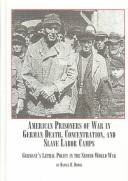| Listing 1 - 6 of 6 |
Sort by
|

ISBN: 3486707833 3486563394 Year: 1998 Publisher: De Gruyter
Abstract | Keywords | Export | Availability | Bookmark
 Loading...
Loading...Choose an application
- Reference Manager
- EndNote
- RefWorks (Direct export to RefWorks)
Hans Reichmann, ehemals Syndikus des Centralvereins deutscher Staatsbürger jüdischen Glaubens, schildert in seinen Aufzeichnungen aus dem Londoner Exil eindringlich die Verfolgung der deutschen Juden in den Jahren 1939 bis 1939. Reichmann wurde wie Zehntausende anderer Juden 1938 im Zuge des November-Pogroms, der sogenannten Reichskristallnacht, verhaftet und in das Konzentrationslager Sachsenhausen verschleppt. Sein schon im Sommer 1939 niedergeschriebener Bericht über das Lagersystem und die besonderen körperlichen und seelischen Mißhandlungen an den jüdischen Häftlingen ist in seiner Unmittelbarkeit ein eindruckvolles und erschütterndes Dokument deutsch-jüdischer Geschichte unter nationalsozialistischer Herrschaft. Leseprobe: "Das Lachen wird ihnen inzwischen in der Kehle erstickt sein." Das Wort schneidet wie ein Messer. Ein kleiner Mann rächt sich. Sonderbar! Ein kleiner Mann erschüttert die Welt. Sie zittert vor ihm. Und ich kann mich noch immer nicht verstehen, den kleinen Mann groß zu sehen, so groß, wie ihn seine Propaganda oder der Haß seiner Feinde macht. Ich weiß, was er angerichtet hat, ich spüre die Realität seiner Macht an mir, nichts und niemand, der solchen Einfluß auf meinen Lebensgang genommen hätte. Der erste Gedanke, wenn ich erwachte und der letzte, wenn endlich der Schlaf kam, den mir sein Wüten so selten ließ. Er hat mir alles genommen, was ich besaß, zweimal den Beruf, Freunde, Familie, Wohnung und Vermögen, er treibt mich aus meinem Vaterland, er wird mich weiter treiben, sein Krieg wird mich verfolgen, seine Bomben und das Giftgas seiner Propaganda, und doch vermag ich nicht, die Persönlichkeit Hitler ernst zu nehmen, den Hysteriker, den Judenfresser, den rachsüchtigen Bösewicht. Die Welt sieht Genialität und Dämonie, ich sehe nur einen genial-dämonischen Zug: die infernalische Verachtung des Menschen, seines eigenen Volkes, dem er schonungslos jede Brutalität, jedes Opfer an Gut, Gesinnung und Leben, jede Gefolgschaft für Abenteuer Jules Vernescher Phantasie zumutet und mit seinem Terror aufzwingt. Der Führer hat das Signal aufgenommen, daß sein 10.November gellend gegeben hat: "Deutschland muß judenrein werden". Entmachtung, Entrechtung, Enteignung - jede Forderung so ungeheuerlich, daß kaum die Radikalsten der Radikalen sie auszusprechen wagten. Aber als das deutsche Volk die Hetzer währen ließ, als kein Proteststurm sie hinwegfegte, als die Auslands-Antwort zwar störte, aber doch nicht realpolitisch gefährlich wurde, da steigerten sich die Haß- und Vernichtungsgelüste des regierenden Pöbels ins Sinnlos-Maßlose. Und was kein Nazipogrom je gefordert, wurde zur Regierungsparole: "Deutschland muß judenrein werden - die Juden müssen raus!" In hundert Abwandlungen tönte sie uns nun entgegen, bald mitleidsvoll, bald schadenfroh, bald gleichgültig das Unabänderliche feststellend, bald haßerfüllt triumphierend.
Kristallnacht, 1938. --- Jews --- Concentration camp inmates --- Persecutions --- Reichmann, Hans, --- Sachsenhausen (Concentration camp) --- Crystal Night, 1938 --- Night of Broken Glass, 1938 --- History --- KZ Sachsenhausen --- Raikhman, Hans, --- רייכמן, הנס --- Nazi concentration camp inmates --- Inmates, Nazi concentration camp --- Nazi concentration camp prisoners --- Nazi concentration camps --- Prisoners
Book
ISBN: 3631769059 3631748663 3631769067 Year: 2019 Publisher: Bern Peter Lang International Academic Publishing Group
Abstract | Keywords | Export | Availability | Bookmark
 Loading...
Loading...Choose an application
- Reference Manager
- EndNote
- RefWorks (Direct export to RefWorks)
This book is rooted in the author’s experience as an interviewer and researcher in the Mauthausen Survivors Documentation Project – the biggest European oral history project devoted to a single Nazi concentration camp system, realized in the years 2002/2003 at the University of Vienna. Over 850 Mauthausen survivors have been recorded worldwide, more than 160 of them in Poland, and over 30 by the author. The work offers an in-depth analysis of Polish survivors’ accounts, sensitive to both, form and content of these stories, as well as their social and cultural framing. The analysis is accompanied by an interpretation of (Polish) camp experiences in a broader biographical and historical perspective. The book is an interpretive journey from camp experiences, through the survivors’ memories, to narratives recalling them − and backwards.
Concentration camp inmates --- World War, 1939-1945 --- Mauthausen (Concentration camp) --- Concentration camp prisoners --- Concentration camps --- Prisoners --- Inmates --- KZ Mauthausen --- Mauthausen (Austria : Concentration camp) --- Mauthausen-Gusen (Concentration camp) --- מאוטהאוזן --- Nazi concentration camp inmates --- Inmates, Nazi concentration camp --- Nazi concentration camp prisoners --- Nazi concentration camps --- Biographical --- biographical memory --- Camp --- Concentration --- concentration camp experience --- Experience --- Filipkowski --- History --- Narrative --- narrative analysis --- Nazi --- Oral --- Perspective --- Polish political prisoners --- survivors‘ testimonies --- World War Two --- World War (1939-1945) --- 1939-1945 --- Austria --- World War II Period

ISBN: 3351034547 3351034504 9783351034504 9783351034542 9783351034702 3351034709 9783351034658 3351034652 9783351032753 3351032757 3351034512 9783351034511 3351034555 9783351034559 9783351034665 3351034660 9783351034689 3351034687 3351034679 9783351034672 Year: 2007 Publisher: Berlin Aufbau-Verlag
Abstract | Keywords | Export | Availability | Bookmark
 Loading...
Loading...Choose an application
- Reference Manager
- EndNote
- RefWorks (Direct export to RefWorks)
Nazi concentration camp escapes --- Nazi concentration camp inmates --- Concentration camp inmates --- Inmates, Nazi concentration camp --- Nazi concentration camp prisoners --- Nazi concentration camps --- Prisoners --- Concentration camp escapes --- Escapes --- Germany --- History --- Short stories, German --- Seghers, Anna, --- Zegers, Anna, --- Radványi, Nelly, --- Radványi, Netty Reiling, --- Seghers, --- Reiling, Netty, --- Seghersová, Anna, --- Zehers, Anna, --- Cekars, An̲n̲ā, --- זעגערס, א. --- Criticism and interpretation. --- German short stories --- German fiction --- Seghers, Anna

ISBN: 077341701X 9780773417014 0773466576 9780773466579 Year: 2003 Publisher: Lewiston : The Edwin Mellen Press,
Abstract | Keywords | Export | Availability | Bookmark
 Loading...
Loading...Choose an application
- Reference Manager
- EndNote
- RefWorks (Direct export to RefWorks)
Using 16 personal interviews, government documents from Germany and the US, the author explores the experience of American POWs who were held in German concentration, death and slave labor camps. The work provides detailed accounts that document the presence of American POWs in these camps, and explores the reasons why the US government systematically suppressed information about them. It affirms that German policy was to kill as many prisoners as possible from all the allied nations, and systematically legalized its actions. It shows that the murder of POWs in death and concentration camps wa
Concentration camp inmates -- Germany. --- Concentration camp inmates -- United States. --- Prisoners of war -- United States. --- World War, 1939-1945 -- Atrocities -- Germany. --- World War, 1939-1945 -- Concentration camps -- Germany. --- World War, 1939-1945 -- Conscript labor -- Germany. --- World War, 1939-1945 -- Prisoners and prisons, German. --- World War, 1939-1945 --- Prisoners of war --- Concentration camp inmates --- History & Archaeology --- History - General --- European War, 1939-1945 --- Second World War, 1939-1945 --- World War 2, 1939-1945 --- World War II, 1939-1945 --- World War Two, 1939-1945 --- WW II (World War, 1939-1945) --- WWII (World War, 1939-1945) --- History, Modern --- Concentration camp prisoners --- Concentration camps --- Prisoners --- Exchange of prisoners of war --- POWs (Prisoners of war) --- War prisoners --- Prisoners and prisons, German --- Conscript labor --- Atrocities --- Inmates --- Nazi concentration camp inmates --- Inmates, Nazi concentration camp --- Nazi concentration camp prisoners --- Nazi concentration camps
Book
ISBN: 1283017695 9786613017697 0252093054 9780252035937 0252035933 9780252077883 0252077881 9780252093050 9781283017695 6613017698 Year: 2011 Publisher: Urbana
Abstract | Keywords | Export | Availability | Bookmark
 Loading...
Loading...Choose an application
- Reference Manager
- EndNote
- RefWorks (Direct export to RefWorks)
Concentration camps --- World War, 1939-1945 --- Concentration camp inmates --- Collective memory --- Memory --- War memorials --- War monuments --- Art and war --- Memorials --- Monuments --- Military parks --- Soldiers' monuments --- European War, 1939-1945 --- Second World War, 1939-1945 --- World War 2, 1939-1945 --- World War II, 1939-1945 --- World War Two, 1939-1945 --- WW II (World War, 1939-1945) --- WWII (World War, 1939-1945) --- History, Modern --- Retention (Psychology) --- Intellect --- Psychology --- Thought and thinking --- Comprehension --- Executive functions (Neuropsychology) --- Mnemonics --- Perseveration (Psychology) --- Reproduction (Psychology) --- Collective remembrance --- Common memory --- Cultural memory --- Emblematic memory --- Historical memory --- National memory --- Public memory --- Social memory --- Social psychology --- Group identity --- National characteristics --- Concentration camp prisoners --- Prisoners --- Death camps --- Detention camps --- Extermination camps --- Internment camps --- Detention of persons --- Military camps --- Social aspects --- Inmates --- Dora (Concentration camp) --- Camp de Dora --- KZ Dora --- Konzentrationslager Dora --- Mittelbau-Dora (Concentration camp) --- Nordhausen (Thuringia, Germany) --- Nordhausen, Ger. --- Nordenhausen (Germany) --- Nordhausen (Erfurt, Germany) --- Nordhausen/Harz (Germany) --- History --- Nazi concentration camps --- Concentration camps, Nazi --- Death camps, Nazi --- Extermination camps, Nazi --- Nazi death camps --- Nazi extermination camps --- Nazi concentration camp inmates --- Inmates, Nazi concentration camp --- Nazi concentration camp prisoners
Book
ISBN: 1845459903 184545698X Year: 2010 Publisher: New York : Berghahn Books,
Abstract | Keywords | Export | Availability | Bookmark
 Loading...
Loading...Choose an application
- Reference Manager
- EndNote
- RefWorks (Direct export to RefWorks)
During World War II at least 13.5 million people were employed as forced labourers in Germany and across the territories occupied by the German Reich. Most came from Russia, Ukraine, Belarus, Moldavia, the Baltic countries, France, Poland and Italy. Among them were 8.4 million civilians working for private companies and public agencies in industry, administration and agriculture. In addition, there were 4.6 million prisoners of war and 1.7 million concentration camp prisoners who were either subjected to forced labour in concentration or similar camps or were 'rented out' or sold by the SS. Wh
Forced labor --- Slavery --- World War, 1939-1945 --- Nazi concentration camp inmates --- Prisoners of war --- History --- Conscript labor --- Germany --- Europe --- Concentration camp inmates --- Inmates, Nazi concentration camp --- Nazi concentration camp prisoners --- Nazi concentration camps --- Prisoners --- European War, 1939-1945 --- Second World War, 1939-1945 --- World War 2, 1939-1945 --- World War II, 1939-1945 --- World War Two, 1939-1945 --- WW II (World War, 1939-1945) --- WWII (World War, 1939-1945) --- History, Modern --- Exchange of prisoners of war --- POWs (Prisoners of war) --- War prisoners --- Abolition of slavery --- Antislavery --- Enslavement --- Mui tsai --- Ownership of slaves --- Servitude --- Slave keeping --- Slave system --- Slaveholding --- Thralldom --- Crimes against humanity --- Serfdom --- Slaveholders --- Slaves --- Compulsory labor --- Labor, Compulsory --- Labor, Forced --- Employees --- Council of Europe countries --- Eastern Hemisphere --- Eurasia --- Alemania --- Ashkenaz --- BRD --- Bu̇gd Naĭramdakh German Uls --- Bundesrepublik Deutschland --- Deguo --- 德国 --- Deutsches Reich --- Deutschland --- Doitsu --- Doitsu Renpō Kyōwakoku --- Federal Republic of Germany --- Federalʹna Respublika Nimechchyny --- FRN --- Gėrman --- German Uls --- Герман Улс --- Germania --- Germanii︠a︡ --- Germanyah --- Gjermani --- Grossdeutsches Reich --- Jirmānīya --- KhBNGU --- Kholboony Bu̇gd Naĭramdakh German Uls --- Nimechchyna --- Repoblika Federalin'i Alemana --- República de Alemania --- República Federal de Alemania --- Republika Federal Alemmana --- Vācijā --- Veĭmarskai︠a︡ Respublika --- Weimar Republic --- Weimarer Republik --- ХБНГУ --- Германия --- جرمانيا --- ドイツ --- ドイツ連邦共和国 --- ドイツ レンポウ キョウワコク --- Germany (East) --- Germany (Territory under Allied occupation, 1945-1955) --- Germany (Territory under Allied occupation, 1945-1955 : British Zone) --- Germany (Territory under Allied occupation, 1945-1955 : French Zone) --- Germany (Territory under Allied occupation, 1945-1955 : Russian Zone) --- Germany (Territory under Allied occupation, 1945-1955 : U.S. Zone) --- Germany (West) --- Holy Roman Empire --- Enslaved persons
| Listing 1 - 6 of 6 |
Sort by
|

 Search
Search Feedback
Feedback About UniCat
About UniCat  Help
Help News
News